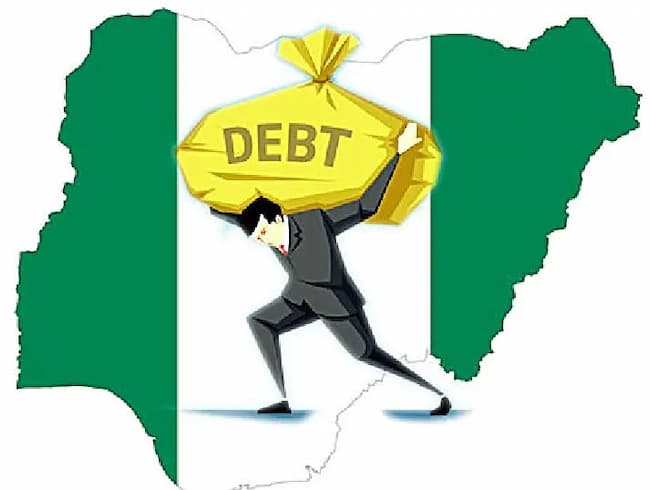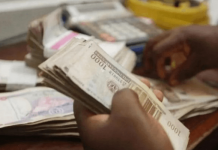According to the 2023-2025 Medium Term Expenditure Framework & Fiscal Strategy Paper, debt servicing consumed N6.16 trillion in 16 months. The Federal Government spent N4.22 trillion in 2021 and an additional N1.94 trillion from January to April 2022 on debt service.
According to a breakdown, domestic debt service in 2021 cost N2.05 trillion while foreign debt service consumed N946.29 billion. There were also N1.22 trillion in interest on ways and means, which is what is meant when the government borrows money from the Central Bank of Nigeria, and an N600 million sinking fund.
The cost of servicing domestic debt in the first four months of 2022 was N1.2 trillion, while the cost of servicing international debt was N334.24 billion. Interest in methods and means reached N405.93 billion as well.
According to the 2023-2025 MTEF/FSP document, the Federal Government also anticipated that debt servicing will cost N10.43 trillion by 2025. This is an increase of 182.66 percent from the N3.69 trillion projected for debt payments in 2022. The Federal Government has consistently received warnings from multilateral organizations and economists about the growing cost of debt payment, which might lead to a disaster for the nation.
The Director General of the Debt Management Office, Patience Oniha, and the Minister of Finance, Budget, and National Planning, Dr. Zainab Ahmed, have stated that the government does not have a debt issue; rather, a revenue issue exists. The DMO noted in a memo recently received by our correspondent that excessive debt levels would frequently result in hefty debt services and affect investments in infrastructure.
According to the DMO DG, “High debt levels lead to heavy debt service which reduces resources available for investment in infrastructure and key sectors of the economy.”
In the document, she stressed the need for debt sustainability, which she defined as the ability to service all current and future obligations while maintaining the capacity to finance policy objectives without resorting to unduly large adjustments or exceptional financing such as arrears accumulation and debt restructuring, which could otherwise compromise the economy’s stability.
Speaking at the launch of the World Bank’s Nigeria Development Update titled, ‘The urgency for business unusual,’ held recently in Abuja, the finance minister had admitted that Nigeria was struggling to service its debt.
She said, “Already, we are struggling with being able to service debt because even though revenue is increasing, the expenditure has been increasing at a much higher rate, so it is a very difficult situation.”
The International Monetary Fund had earlier warned that debt servicing might gulp 100 per cent of the Federal Government’s revenue by 2026 if the government failed to implement adequate measures to improve revenue generation.
According to the IMF’s Resident Representative for Nigeria, Ari Aisen, based on a macro-fiscal stress test that was conducted on Nigeria, interest payments on debts might wipe up the country’s entire earnings in the next four years.
Aisen said, “The biggest critical aspect for Nigeria is that we have done a macro-fiscal stress test, and what you observe is the interest payments as a share of the revenue. As you see us in terms of the baseline from the Federal Government of Nigeria, the revenue of almost 100 per cent is projected by 2026 to be taken by debt service.”
“So, the fiscal space or the amount of revenues that will be needed and this, without considering any shock, is that most of the revenues of the Federal Government are now, in fact, 89 per cent and it will continue if nothing is done to be taken by debt service.”
Less than two months after Aisen’s warning, the finance minister disclosed that Nigeria used 118 per cent of its revenue to service debts. Nigeria’s debt servicing bill increased by 109 per cent, from N429bn in December 2021 to N896bn in March 2022.
A report by the Nigerian Economic Summit Group and the Open Society Initiative for West Africa has disclosed that Nigeria and 10 other Economic communities of West African States countries were currently in debt distress based on debt sustainability analysis.
The 10 other countries are Benin, Burkina Faso, Cabo Verde, the Gambia, Ghana, Guinea Bissau, Liberia, Niger, Senegal, and Togo. The World Bank recently said that Nigeria’s debt, which might be considered sustainable for now, was vulnerable and costly.
According to the Washington-based global financial institution, the country’s debt was also at risk of becoming unsustainable in the event of macro-fiscal shocks.
The World Bank recently said that Nigerian states would likely lose N18.8bn in oil and gas revenues in 2022, as worsening revenue collection at the federation level would increase budgetary pressures for the states. According to the global lender, the declining revenue from the federation had put many states in a precarious fiscal position.
The financial institution also warned that there would be a 2.7 per cent decline in FAAC transfers in 2022 when compared to 2021, noting that this decline would push states to borrow more and slash discretionary expenditure.
















